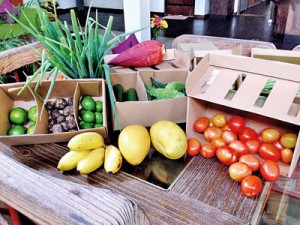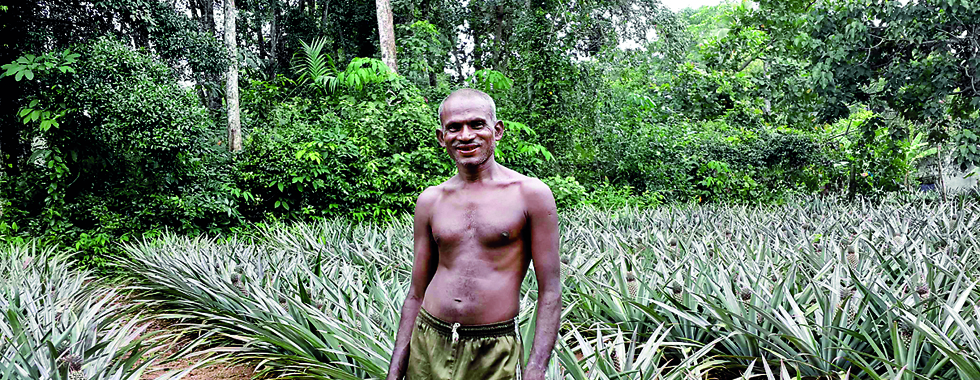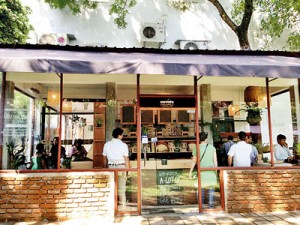Organic veggies with farmers and consumers in mind
Agriculture has come a long way from its humble beginnings, believes Founder and Chairman of Saaraketha Holdings, Prasanna Hettiarachchi, who launched his organic initiative five years ago.
“It’s not about the amude and kattha anymore,” he says. For, technology has changed how we approach things and farming is no exception.
Saaraketha describes itself as “a catalyst that enables rural smallholder farms to embrace sustainable methods of production”. It engages with farms in areas like Kirindiwela, Haputale, Matale and Mahiyangana to bring fresh, organically-grown produce to the consumer through its website (www.saaraketha.com) and now through its newly-opened shop Streat 360 on Ward Place, Colombo 7.
Eating well doesn’t have to be boring, says its founder, highlighting the many different varieties of vegetables and grains produced by the farmers they work with. A quick visit to the website finds a carefully curated selection of products on display, as numerous as they are familiar. Here you can buy vegetables ranging from ladies’ fingers to zucchini and also indulge in fruits like pomegranate and mangosteen. Herbs

A farmer involved in the venture
such as rosemary and thyme jostle for space alongside hathawariya and gotukola. Grains and spices are also available, as are several varieties of heirloom rice.
Prasanna himself is a former corporate professional turned entrepreneur. He has over a decade of experience in the apparel industry, having served as General Manager at MAS Holdings. The company’s commitment to sustainability and ethical service provision was the foundation for his thinking, he notes. Nothing came to be, however, until his father bequeathed to him in 2000, a property in Weerawila — a piece of dry arid land that had resisted all attempts to farm it.
“I somehow managed to plant a large number of trees on that property,” he remembers. “It was hard work. But when you see those trees grow before your eyes — well, I fell in love.”
His curiosity led him to learn more about farming and to international bodies and universities such as the International Centre of Agroforestry and MIT. Prasanna and his team identified a drawback common to most farming communities. “Most rural farmers put all their hopes on a

The store with a difference and above (left) and below (left) some of the products available
single crop,” he shares. “Moreover, farming is not approached as a business, but more a subsistence occupation. I wondered if we could change that.”
A farming community in Mahiyangana was the first partner of this initiative. Technology played a big role in ensuring the organic nature of their produce. The Ritsumeikan University of Japan provided them with a weather station to get real time data on rainfall, humidity and temperature and even the sap flow of a tree. A technology known as GigaPan in collaboration with the Carnegie Mellon University enabled them to photograph in minute detail the farming area, so whenever a problem arose they could send the images to foreign consultants who would be able to identify it and provide solutions. GPS technology was used to oversee the terrain. “We built a global environment in a very local community,” says Prasanna.
After three years, however, Prasanna realised that while the rear end of the production chain was a satisfying place to be, it wasn’t exactly bringing in revenue for his business. That’s why he moved to the front-end: Today Saaraketha works with carefully chosen farming communities around the country that have been certified as organic (with Control Union certification), buying their produce at a price far above the market rate and making it available for their retail consumers. “If organic produce are to become mainstream we need to change the consumer mindset,” he explains. “The farmers must have customers who are willing to buy their organically grown crop after all.”

Prasanna
Saaraketha sets high standards for its farming clusters, Prasanna goes on to explain, as the produce brought to Colombo is rechecked to ensure standards before being washed, repackaged and distributed. “We have one coordinator in each cluster who oversees the farms and coordinates with the farmers,” he says. “We have set a specific guide to quality and farmers are rewarded for it as they receive a price well above what they would receive in the market.”
You can order their products through the site, but with the opening of their first official store at the Streat 360 restaurant on Ward Place it might be easier to buy your produce from the store. The decision to open a shop as part of a restaurant premises was consciously made, says Prasanna. “Eating organically is a lifestyle choice. While the shop is not directly a part of the restaurant, we think it highlights the fact that you can make organic produce part of your lifestyle.”


